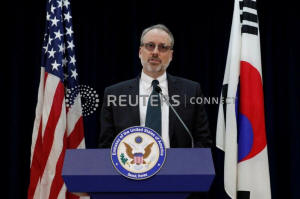Seoul, Washington fail to agree on cost of U.S. troops; U.S. denies $5
billion demand
 Send a link to a friend
Send a link to a friend
 [December 18, 2019]
By Josh Smith [December 18, 2019]
By Josh Smith
SEOUL (Reuters) - South Korea and the
United States failed on Wednesday to reach an agreement over Seoul's
contribution toward hosting some 28,500 U.S. troops, ending two days of
talks that were the last before their existing deal expires on Dec. 31.
U.S. President Donald Trump has accused South Korea of being a rich
nation that is profiting off the U.S. military forces, which are
stationed in the country as a legacy of the 1950-1953 Korean War and
continued threats from North Korea.
South Korean lawmakers have said Washington is seeking up to $5 billion
a year to support the troops - more than five times the amount Seoul
agreed to pay this year.
But the U.S.'s chief negotiator James DeHart told reporters after
Wednesday's meeting that "($5 billion) is not the number we are
currently focusing on in the negotiation," according to Yonhap News
Agency.

"We have been coordinating and compromising. But the figure we agree on
will be very different from our initial proposal and will also be
different from what we are currently hearing from the Korean side," he
added.
As part of his 'America First" policy, Trump has demanded that many U.S.
allies, including NATO members and Japan, pay more toward defense.
The lack of a deal in the talks, led on South Korea's side by chief
negotiator Jeong Eun-bo, could result in a repeat of last year when the
two countries missed a year-end deadline but reached a retroactive
agreement in the new year.
Some experts, both U.S. and Korean, have warned that if no agreement is
reached, it could throw the future of the U.S. presence in South Korea
into doubt.
The next set of talks will be in the United States in January, with the
exact timing still to be determined.
South Korea's Foreign Ministry said their negotiators emphasized the
need for "fair, reasonable and mutually acceptable agreements," that
will strengthen the alliance.
[to top of second column]
|

James DeHart, U.S. Department of State’s a senior advisor for
security negotiations and agreements bureau of political-military
affairs, speaks after a meeting with South Korean counterpart on the
Special Measures Agreement (SMA) at the public affairs section of
the U.S. Embassy in Seoul, South Korea November 19, 2019. Lee
Jin-man/Pool via REUTERS

"The two sides have expanded their understanding of each other
through many discussions despite differences in their positions on
various issues, and decided to continue close consultations," it
said in a statement.
The dispute has been a rare public sign of discord in the alliance
that has for 70 years formed a buffer against North Korean
aggression. The two Koreas remain technically at war, after the
Korean War ended in a truce but not a peace treaty.
There have been several public protests in South Korea against the
U.S. calls for more money, and a survey by the Chicago Council of
Global Affairs found that only 4% of South Korean respondents said
Seoul should meet Trump's demands.
On the other hand, 74% of those questioned said they supported the
long-term stationing of American troops in South Korea.
If no deal is reached, the most immediate effect may be on thousands
of South Korean civilians who work for the U.S. military and who
could be placed on unpaid leave.
(Reporting by Josh Smith and Joori Roh; Editing by Edwina Gibbs and
Hugh Lawson)
[© 2019 Thomson Reuters. All rights
reserved.]
Copyright 2019 Reuters. All rights reserved. This material may not be published,
broadcast, rewritten or redistributed.
Thompson Reuters is solely responsible for this content.
 |